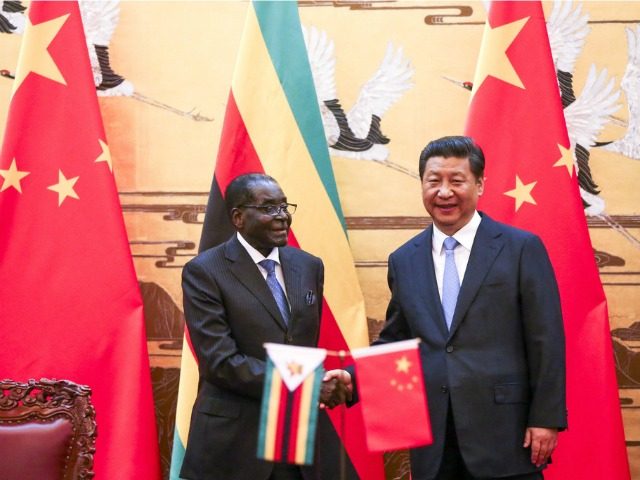The Chinese government is touting the support of “dozens” of countries for its illegal colonization of the South China Sea, with particular praise for Zimbabwean dictator Robert Mugabe’s statement opposing the arbitration of China’s territorial dispute in international court.
“President Mugabe has made it clear that he supports the position of the Chinese side on the South China Sea,” Chinese Vice Foreign Minister Zhang Ming said Thursday, noting that he had met with Mugabe during a visit to Zimbabwe and received his approval of China’s claims in the region personally. The report citing Zhang, run in Beijing state-run publication Xinhua, does not specify whether Mugabe will actively participate in opposing an international court case against China regarding its illegal construction of military facilities in the Spratly and Paracel Islands, and by the Scarborough Shoal, all land formations in the South China Sea.
China unilaterally issued a decree stating that most of the South China Sea is sovereign Chinese territory. The waters Beijing claims, however, overlap with the sovereign territory of the Philippines, Taiwan, Brunei, Vietnam, Malaysia, and the Philippines. It is also extremely close to Indonesia’s Natuna Island, prompting the government of Indonesia to warn that it, too, may sue China in international court if it further expands its border.
In addition to proclaiming territories in the South China Sea under the purview of Beijing, China has built numerous artificial islands equipped with landing strips, lighthouses, surveillance technology, and weaponry. The Philippines has filed a case with the Permanent Court of Arbitration at The Hague; a verdict is expected this summer.
China has vowed to disregard the verdict, regardless of outcome. It is now also claiming that more than 40 countries support its claims in the region. The list of supporters is unusual, as most nations are nowhere near the South China Sea, and many are landlocked. All, however, are nations that have something to gain from Chinese economic investment in their markets.
Reuters lists Niger and Afghanistan as being publicly pro-China in the dispute. On Thursday, China touted the support of Pakistani President Mamnoon Hussain, who also stated he hopes Pakistan will “continue its close cooperation with China in economic development.” More recent declarations of support for Chinese colonization in the region have come from the leaders of Zambia, Cameroon, Ethiopia, Malawi, and Serbia.
The only nation affected by China’s expansion in the South China Sea to support China is Brunei. China has also used Taiwan’s maritime claims as evidence of its control of the region, as China does not acknowledge Taiwan’s sovereignty.
When not touting the support of an assortment of African nations who depend on China economically thousands of miles away, the Chinese government is sternly asserting that outside parties should not have a say in the dispute.
“The so-called South China Sea issue is an issue between China and littoral countries of the South China Sea,” Chinese Foreign Ministry spokesperson Lu Kang said earlier this month, quoted in Xinhua Thursday in an article demanding parties supportive of the Philippines in its arbitration, like the United States, to stay silent.
The U.S. Department of Defense has repeatedly discouraged China from continuing its artificial constructions in the region, conducting multiple “freedom of navigation” exercises near the Spratly and Paracel Islands to assert the right of non-Chinese ships to travel there. Most recently, the U.S. Navy deployed four growler aircraft and 120 troops to assist in the defense of the Philippines, which recently signed a new defense deal with the United States.

COMMENTS
Please let us know if you're having issues with commenting.